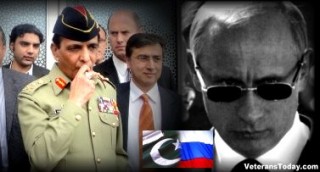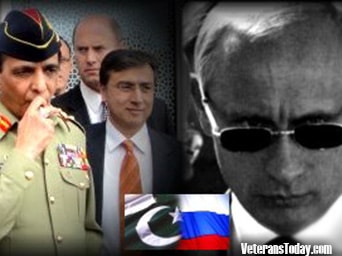With global geopolitics rapidly evolving and progressing into a dynamic wave of new-founded strategic partnerships, Pakistan and Russia have resorted to making most of the current scenario by increasing bilateral communication for subsequent understanding.
by Zaki Khalid
 It’s not easy to brush away historical enmity that easily. Let’s be clear, Pakistan and Russia have enjoyed “sour”, if not bitter ties especially since the beginning of the Zulfiqar Ali Bhutto days right up to the peak in General Zia ul Haq’s era when the Afghan Jihad was on with full swing, having a US-Saudi-Pakistan nexus on the one side and USSR (now Russia) on the other. The GHQ and Kremlin have preferred to maintain a “neither friend, nor foe” stance for each other.
It’s not easy to brush away historical enmity that easily. Let’s be clear, Pakistan and Russia have enjoyed “sour”, if not bitter ties especially since the beginning of the Zulfiqar Ali Bhutto days right up to the peak in General Zia ul Haq’s era when the Afghan Jihad was on with full swing, having a US-Saudi-Pakistan nexus on the one side and USSR (now Russia) on the other. The GHQ and Kremlin have preferred to maintain a “neither friend, nor foe” stance for each other.
However, deep wounds do sometimes tend to soften up when there are strategic vantage points ready to benefit from. And General Kayani understands it better than anyone else. Known among mid-level officers as “America’s Most Despised Paki Khaki” within the military today, he knows how to play his cards well. By allowing the present government to continue whatever notorious relations it wants with the US government, Pakistan’s Chief of Army Staff has kept himself abreast of the typical media onslaught which routinely manhandled former General Pervez Musharraf when he intervened in state matters which are surely no premise for any military man. I have been told by good acquaintances that General Kayani has been discussing some innovative standby plans with the elite advisors in the Strategic Plans Division according to which Pakistan’s armed forces will not only cooperate but rather themselves make way for a standalone ‘Look East’ policy in the best interests of national security. Of course when I say “best interests”, I am not carrying water for the establishment but rather talking in the wider context of the precarious regional developments picking pace, and which many of us rightly believe are bent on putting the world on the verge of another Grand War, if not the anticipated “World War 3”.
Word has it that over the past 2 years, Pakistan’s military elites have prepared and documented a comprehensive “Grand War Defence program” which centers around the fact that Pakistan will not only defend itself in case a regional war is set-off but will also not hesitate to conduct limited, specified attacks on hostile installations abroad (the dunes and waterways in the Middle East). In this regard, the Pakistan Navy’s recent full-fledged ‘Exercise SEASPARK-12’ is worth mentioning; these are not your average annual naval exercises. The official navy press releases quoting Admiral Asif Sandila, Chief of Pakistan’s Naval Staff reflect the overwhelmingly new resolve whose genesis can be traced to the jam-packed agenda talks held under the leadership of Generals Kayani, Khalid Shamim Wynne and Kidwai.
For Pakistan’s military establishment, I believe the most possible reasons for reaching out to Russia are many; however, most notable among them, the uniting factor for these two countries, seems to be the sheer differences with NATO. Pakistan has been maintaining a very complicated relationship with NATO and ISAF. Especially after the attacks on Salala (which were spearheaded by the CIA’S Special Activities Division but also supported by NATO) and the planned incursion into Pakistani territory during the Musharraf era. Since long, Rawalpindi has been hinting at a possible alliance between the US JSOC and NATO’s Special Operations Forces for obvious reasons. Of late, NATO Chief Anders Fogh Rasmussen has also been expressing unwanted concern over the safety of Pakistan’s nukes, echoing what former CIA Chief and current US Defence Secretary Leon Panetta shoots off every now and then. General John Allen has been vying to “calm Kayani down” over repeated Western aggression but to no avail. It is not that General Kayani and his corps commanders are not coordinating with NATO anymore, the trust deficit is enormous to the point that one source in the General Head Quarters said that this will only keep on widening, never to hamper down ever again.
So we have Pakistan’s very open friction with NATO and similarly, Russia’s forehead too is reddening with frustration. Recently, Zamir Kabulov who is Putin’s special representative to Afghanistan, pointed at the Kremlin’s green signal for NATO to use its territory for logistics. Kabulov was quoted by Interfax:
“The Ulyanovsk transit-transshipment point is in principle already ready to handle cargo and transfers,” Kabulov said… “We gave the NATO people permission, and now it depends on whether they want to use it.”
Let us bear in mind that when we talk of business, the Russians never miss to catch the golden hen. They know fully well that providing NATO with an alternative land route will surely cost the latter more than their budget could manage and this is exactly what Putin has in mind. He wants to apparently help them out on one hand and boost national economy on the other. Joshua Kucera of Eurasia.net’s The Bug Pit observes:
Kabulov added that the transit through Russia would be more expensive for NATO than through Pakistan, but it would be more reliable: “Everything gets there [via Russia], but there [through Pakistan] it doesn’t, as experience shows.”
This happens to be the most simple summary of what seems to be under hand. Firstly, Russia’s approval for NATO supplies will not only provide much financial benefit to the Russians but on the other hand, Pakistan could manage to announce a permanent suspension of route permits through its territory which could considerably help extinguishing the massive resentment in the hearts and minds of ordinary Pakistani citizens.
But is this the start of a blossoming NATO-Russia alliance? Not really. This is the Asian aspect. On the Middle Eastern front, Russia and NATO have been exchanging a war of words over Syria. The US is leading the ‘Condemn Russia’ campaign while manufacturing rigorous propaganda over the Syrian crisis in cahoots with Turkey, UK and France. As we all know, Russia and China are the only major world powers still resisting a complete onslaught against the Assad regime since Russia has a horde of strategic interests to protect in the region especially the naval facilities it has and the investments in oil and gas deposits of Syria. Also, Syria happens to be the only satellite state which Russia has in the entire Middle East. No other Arab state has ever developed as close ties with the Kremlin than Syria has.
My personal hint is that Russia is trying to hammer down NATO at least from one axis i.e. in Afghanistan. Just about 3 days ago, Putin lashed out at NATO with the following stern message:
“…I have always believed that NATO is a Cold War atavism. It was set up at a time, when there was a bipolar system in international relations. Today, that situation has changed, therefore, it is hard to justify …why …NATO should be existing today”.
Whereas surprisingly, the same Russia wants continued presence of NATO for more time in the war-affected country. Russia’s envoy to NATO Nikolay Korchunov was quoted by RT as saying:
“In our opinion, it would not be totally correct to set any artificial timeframe for soldiers’ withdrawal until the Afghan side is capable of maintaining security in its state on its own”.
These seem like two opposite statements but they are two sides of the same coin. I strongly believe Russia fully understands that as history as shown, no invading force including their own in the former USSR managed to leave Afghanistan without a stub of massive defeat and humiliation for the rest of their lives. Furthermore, Russia knows Pakistan is the most influential intermediary for Afghanistan and the NATO-ISAF dependence on Pakistan to pave way for a safe exit is at an all-time high. In short, modern Russia has learnt its lesson from the past well and sees Afghan Taliban as the eventual controller of the post-war Afghanistan and that is why they would surely be more than happy to keep NATO and the US well knee-deep in the war torn country’s quicksand. This is primarily for 3 reasons: Firstly, Russia is severely unhappy with the US-NATO missile defence shields in Europe and Turkey including the US shield in Poland and Georgia. Secondly, by pressuring NATO to get deeper into Afghanistan, the focus from the Syrian crisis will considerably be removed and lastly, NATO might have to succumb to its end which Vladimir Putin at least would not miss a chance to see.
To round it up, I believe the powerful friction with NATO is the focal point and uniting factor for Russia and Pakistan’s establishments.
Now coming to General Kayani’s visit to Russia: This is a first in history that a Pakistani military official of such rank (Army Chief) ever visited the large state. What makes it even more interesting for me, personally, is that both Kayani and Putin are former spy chiefs. During the USSR era, Putin started out as a KGB officer with a stint in East Germany and after the empire’s collapse, he was made Chief of the FSB (Russian intelligence, successor to the KGB) during Boris Yeltsin’s tenure in 1997. Putin has been a highly experienced spy master, long before General Kayani, who also was once the Director General of Pakistan’s world-renowned Inter-Services Intelligence, appointed by General Musharraf with a service span of 3 years (October 2004-October 2007). Both Kayani and Putin have ‘been there, done that’. Would it be too exaggerating to say that who knows actual geopolitics better than spy chiefs?
Hence, this meeting holds tremendous symbolic significance. And at what a splendid timing: The US has been trying to sharpen its knife to sacrifice Pakistan on the ‘War Against Terrorism’s Altar’ and India too has been rapidly expanding its strategic military and diplomatic assets to bash Pakistani interests in the region. No matter how much they seem unaffected, the US and India have their tails set on fire.
Word has it that since the long blockade of NATO supply logistics, intelligence agencies of Pakistan and Russia have been working on confidence-building measures. Significant progress has taken place in communication between the ISI and the FSB. Post NATO-ISAF scenario for Afghanistan have been the hot topics of discussion between Rawalpindi and Moscow. Before General Kayani left for Russia, he had signed a series of cooperative papers with China for expansive military cooperation. Chinese and recently Russian military elites have expressed interest in forming an alliance with Pakistan for better safeguarding and strengthening the Afghanistan, Central Asian and Caucasus regions’ security network (Kazakhstan, Kyrgyzstan, Uzbekistan, etc). Pakistan’s intelligence has provided a set of papers and footage to Chinese and Russian authorities with incriminating evidence of CIA and US Special Forces’ terror recruitment where suicide bombers and assassins are literally bought for cash, trained and then used for attacks in Pakistan (TTP), China (ETIM) and Russia (Al Qaeda offshoots self-proclaiming to be fighters for the Chechen cause).
On another note, and which might sound far-fetched for many, Pakistani intelligence also has detailed documents on the US/NATO drive to push for the overthrow of the Assad regime via proxy Islamists such as the FSA and Hizbut Tahrir. Sources made it clear, however, that Pakistan’s military/intelligence elites have chosen to remain neutral on the Syrian crisis: supporting neither Assad nor the self-proclaimed rebels. It was Pakistani influence which compelled Arab states such as Saudi Arabia to fend off biased hype against Syria… but that’s another story.
Pakistan’s experience in understanding the proxy pseudo-Islamic mindset of radical terror groups run by heretics will prove to be a very helpful hand for Russia since it is itself facing severe terrorism from elements within. The arrest of Hizbut Tahrir members in Chelyabinsk (Tatarstan) by the FSB was a success for Russia. Similarly, another grand arc of evil was busted in Kyrgyzstan which had links to British/American operatives in South Jalalabad (Afghanistan). Pakistani and Turkish intelligence know the Central Asian CIA undertakings well; hook this up with the complex web in Afghanistan and who better an aide to have than the ISI?
On a side note, let us not get too hyped up about what benefits Pakistan will get from this visit. There are rumors that Pakistan’s military chief will be requesting Putin for investment in Pakistan’s nuclear sector and also to make up for the Gazprom-IPI issue. There can be a ton of speculations on these cases but the fundamental point that really needs to be emphasized here is that this visit, hopefully the trigger for future ones, serves more an ominous purpose rather than an immediate MoU signing marathon. There might be one or two deals signed but for me, they do not really matter. In the defence sector, I do not foresee any major cooperation. General Kayani’s prime motive for the meeting with General Makarov, Putin and the rest is the post NATO-ISAF restructuring scenario for Afghanistan: these are the points in time for global powers rush for gaining leverage over others in fierce competition. Amongst other things Pakistan’s military will be assuring Russia that unlike the past where the USSR was told to back-off from the warm waters of the Arabian Sea, they will be allowed access; that of course, within a freshly specified framework. Iran already has very warm ties with Russia especially diplomatically (regarding Syria) and militarily (production of missiles, etc.). The addition of Pakistan will provide Russia with the geographic balance it needs among two dominant Muslim states to have a proper say in the affairs of Afghanistan and send the Yanks packing home.
General Kayani’s dynamic ‘Look East’ policy will help Pakistan forge the much needed new relationships with ‘non-conventional allies‘ if I may say so in a very cheeky way (being modest). It might be that during tense stand-offs with India, Russia might intervene for settling down of matters rather than the US. Additionally, better and more trust-based bilateral ties on economic and scientific matters might be fostered.
China is already in Pakistan’s list of strategic allies. Though Rawalpindi and Moscow still have many bumps and cuts to cross by, well at least the road is still there. To round up all my long process of thoughts in a single statement, Pakistan and Russia share this common objective: “I scratch your back, you scratch mine“.

Zaki is a geopolitics and security analyst based in Lahore, Pakistan who has a keen interest in the study of Open-Source Intelligence and Psychological Warfare. He covers the global scenario with a special emphasis on the MENA and Asia regions at large. He has a Bachelors degree with majors in French, Journalism and Education from the University of Punjab.
His brief independent profile can be viewed here: http://cuttings.me/users/zakikhalid
Besides contributing to VT as a columnist, he is the Director General at Terminal X (www.terminalx.org), Pakistan’s most authoritative portal on defence, intelligence and geopolitics. TX is considered an authority on references from the Pakistani military and intelligence developments, having been taken on air by TVN Chile, Iran’s Press TV and Radio Channel Islam International (South Africa), to name a few.
Personal blog: http://zakikhalidtx.tumblr.com/
ATTENTION READERS
We See The World From All Sides and Want YOU To Be Fully InformedIn fact, intentional disinformation is a disgraceful scourge in media today. So to assuage any possible errant incorrect information posted herein, we strongly encourage you to seek corroboration from other non-VT sources before forming an educated opinion.
About VT - Policies & Disclosures - Comment Policy




